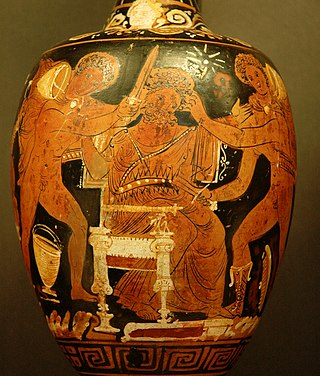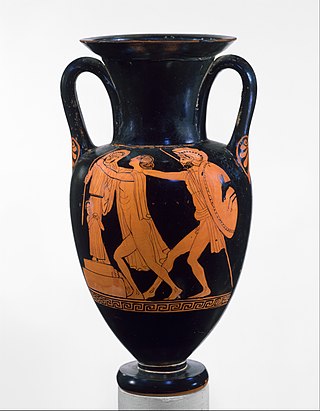Related Research Articles

In Greek mythology, Agamemnon was a king of Mycenae who commanded the Achaeans during the Trojan War. He was the son of King Atreus and Queen Aerope, the brother of Menelaus, the husband of Clytemnestra, and the father of Iphigenia, Iphianassa, Electra, Laodike, Orestes and Chrysothemis. Legends make him the king of Mycenae or Argos, thought to be different names for the same area. Agamemnon was killed upon his return from Troy by Clytemnestra, or in an older version of the story, by Clytemnestra's lover Aegisthus.

Aeschylus was an ancient Greek tragedian often described as the father of tragedy. Academic knowledge of the genre begins with his work, and understanding of earlier Greek tragedy is largely based on inferences made from reading his surviving plays. According to Aristotle, he expanded the number of characters in the theatre and allowed conflict among them. Formerly, characters interacted only with the chorus.

Aegisthus was a figure in Greek mythology. Aegisthus is known from two primary sources: the first is Homer's Odyssey, believed to have been first written down by Homer at the end of the 8th century BC, and the second from Aeschylus's Oresteia, written in the 5th century BC. Aegisthus also features heavily in the action of Euripides's Electra, although his character remains offstage.

Cassandra or Kassandra in Greek mythology was a Trojan priestess dedicated to the god Apollo and fated by him to utter true prophecies but never to be believed. In modern usage her name is employed as a rhetorical device to indicate a person whose accurate prophecies, generally of impending disaster, are not believed.
Hubris, or less frequently hybris, describes a personality quality of extreme or excessive pride or dangerous overconfidence and complacency, often in combination with arrogance. The term arrogance comes from the Latin adrogare, meaning "to feel that one has a right to demand certain attitudes and behaviors from other people". To arrogate means "to claim or seize without justification... To make undue claims to having", or "to claim or seize without right... to ascribe or attribute without reason". The term pretension is also associated with the term hubris, but is not synonymous with it.
In Greek mythology, Ate, Até or Aite was the goddess of mischief, delusion, ruin, and blind folly, rash action and reckless impulse who led men down the path of ruin. She also led both gods and men to rash and inconsiderate actions and to suffering.

Phobos is the god and personification of fear and panic in Greek mythology. Phobos was the son of Ares and Aphrodite, and the brother of Deimos. He does not have a major role in mythology outside of being his father's attendant.
In Greek mythology, Strophius was the name of the following personages:

In Greek mythology, Aerope was a Cretan princess as the daughter of Catreus, king of Crete. She was the sister to Clymene, Apemosyne and Althaemenes. Aerope's father Catreus gave her to Nauplius, to be drowned, or sold abroad, but Nauplius spared her, and she became the wife of Atreus, or Pleisthenes, and by most accounts the mother of Agamemnon and Menelaus. While the wife of Atreus, she became the lover of his brother Thyestes, and gave Thyestes the golden lamb, by which he became the king of Mycenae.
In Greek mythology, Pleisthenes or Plisthenes, is the name of several members of the house of Tantalus, the most important being a son of Atreus, said to be the father of Agamemnon and Menelaus. Although these two brothers are usually considered to be the sons of Atreus himself, according to some accounts, Pleisthenes was their father, but he died, and Agamemnon and Menelaus were adopted by their grandfather Atreus.

The Oresteia is a trilogy of Greek tragedies written by Aeschylus in the 5th century BCE, concerning the murder of Agamemnon by Clytemnestra, the murder of Clytemnestra by Orestes, the trial of Orestes, the end of the curse on the House of Atreus and the pacification of the Furies.
Sophrosyne is an ancient Greek concept of an ideal of excellence of character and soundness of mind, which when combined in one well-balanced individual leads to other qualities, such as temperance, moderation, prudence, purity, decorum, and self-control. An adjectival form is "sophron".

Euripides' Electra is a play probably written in the mid 410s BC, likely before 413 BC. It is unclear whether it was first produced before or after Sophocles' version of the Electra story.
The Nostoi, also known as Returns or Returns of the Greeks, is a lost epic of ancient Greek literature. It was one of the Epic Cycle, that is, the Trojan cycle, which told the entire history of the Trojan War in epic verse. The story of the Nostoi comes chronologically after that of the Iliupersis, and is followed by that of the Odyssey. The author of the Nostoi is uncertain; ancient writers attributed the poem variously to Agias, Homer, and Eumelos of Corinth. The poem comprised five books of verse in dactylic hexameter. The word nostos means "return home".

Clytemnestra, in Greek mythology, was the wife of Agamemnon, king of Mycenae, and the half-sister of Helen of Troy. In Aeschylus' Oresteia, she murders Agamemnon – said by Euripides to be her second husband – and the Trojan princess Cassandra, whom Agamemnon had taken as a war prize following the sack of Troy; however, in Homer's Odyssey, her role in Agamemnon's death is unclear and her character is significantly more subdued.
In Greek mythology, Polyphontes was the son of Autophonus, a warrior who figured in Polynices' war to regain the throne of Thebes from his brother, Eteocles.

"Live by the sword, die by the sword" is a proverb in the form of a parallel phrase, derived from the Gospel of Matthew : "Then said Jesus unto him, Put up again thy sword into his place: for all they that take the sword shall perish with the sword."

Philoctetes is a play by the Athenian poet Aeschylus. It was probably first produced during the 470s BCE. It is now lost except for a few fragments. Most of what we know of the plot is from the writings of 1st century orator Dio Chrysostom, who compared the Philoctetes plays of Aeschylus, Euripides and Sophocles.

Walter George Headlam was a British classical scholar and poet, perhaps best remembered for his work on the Mimes of Herodas. He was described as "one of the leading Greek scholars of his time."

Thrasops is a genus of snakes in the family Colubridae. The genus is endemic to Africa.
References
- Aeschylus, Agamemnon in Aeschylus, with an English translation by Herbert Weir Smyth, Ph. D. in two volumes, Vol 2, Cambridge, Massachusetts, Harvard University Press, 1926. Online version at the Perseus Digital Library.